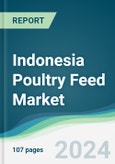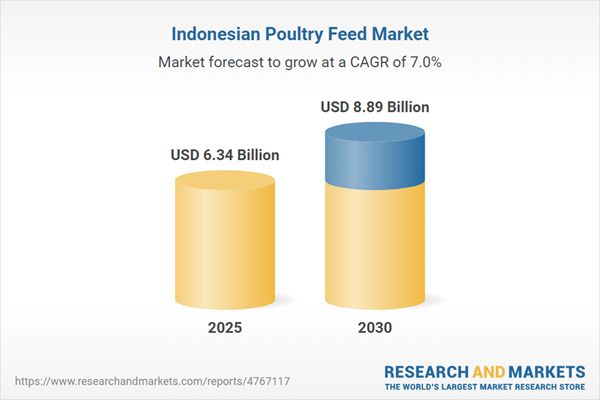The improvements in feed formulation technologies, growing sustainable farming methods, and animal welfare in Indonesia have emphasized how crucial creative feed solutions are. Moreover, government rules, which prioritize safety standards and encourage ethical production methods, and import of feed also aid in the development of theanimal feedsector. For instance, Ministry of Agriculture (MOA) Regulation Number 13/2019 outlines new regulations regarding importing animal-based feed ingredients. All feed ingredients derived from poultry and ruminants are subject to the regulation. The regulation lays out the requirements for animal health in the country of origin and describes the registration processes for production and trans-loading facilities.
Likewise, numerous significantpoultry feedsuppliers are attempting to capitalize on the expanding Indonesian poultry feed market and the country's need for corn feed. For example, in May 2023, PT Japfa Comfeed Indonesia Tbk (JAPFA) unveiled Olagud, its newest brand, through its downstream company, JAPFA Food. Olagud provides a range of goods, from ready-to-eat probiotic chicken dishes to fresh probiotic chicken. It is well known that probiotic chicken has more protein and less fat than conventional chicken.
The growing middle class and expanding population in Indonesia are the main factors driving the market. Due to shifts in lifestyles, there has been a keen observable upward trend in meat consumption, which has been running concurrently with an expansion of the livestock sector, leading to increased production of corn and wheat in Indonesia. For instance, the installed capacity for corn mills is predicted to rise from 4,000 MT per day in 2021/22 to 4,500 MT per day in 2022/2023.
Indonesia poultry feed market growth drivers
Rising demand for chicken meat.The population's growing meat consumption is closely correlated with Indonesia's growing meat demand. The nation's total meat consumption is rising as more people look for meat products. Rising incomes, standards of living, and knowledge about the health advantages of eating meat have coincided to make more people opt for meat compared to other food types like carbohydrate-rich foods, especially corn products. This leads to more people preferring meat agencies in a given environment over time. Chicken production mainly has driven this demand growth as shown by increased sales of chicken products such as eggs and macaroni in Indonesia thus poultry feed market expansion. For instance, poultry meat production increased from 50,830.76 tonnes in 2022 to 51,270.23 tonnes in 2023.
In Indonesia, the main causes of changing consumption patterns include a rapidly urbanizing country, the adoption of a busy lifestyle, and the increasing importance of mega supermarket chains and foreign food companies. This stimulates demand for more convenient products among others like TESCO and Carrefour outlets, etc. In this regard, even more people are opting out of home-cooked meals for packaged snacks like burgers or fried chicken from their neighboring fast food restaurants, hence contributing to this trend of unhealthy eating habits. Moreover, higher incomes lead to more wealth, which means more animal feed can be imported into the country. for instance, between 2022 and 2023, Indonesia experienced a rise in its GDP per capita from $4,787.9 in 2022 to $4,940.9 in 2023.
Reasons for buying this report:
- Insightful Analysis: Gain detailed market insights covering major as well as emerging geographical regions, focusing on customer segments, government policies and socio-economic factors, consumer preferences, industry verticals, other sub-segments.
- Competitive Landscape: Understand the strategic maneuvers employed by key players globally to understand possible market penetration with the correct strategy.
- Market Drivers & Future Trends: Explore the dynamic factors and pivotal market trends and how they will shape up future market developments.
- Actionable Recommendations: Utilize the insights to exercise strategic decision to uncover new business streams and revenues in a dynamic environment.
- Caters to a Wide Audience: Beneficial and cost-effective for startups, research institutions, consultants, SMEs, and large enterprises.
What do businesses use our reports for?
Industry and Market Insights, Opportunity Assessment, Product Demand Forecasting, Market Entry Strategy, Geographical Expansion, Capital Investment Decisions, Regulatory Framework & Implications, New Product Development, Competitive IntelligenceReport Coverage:
- Historical data & forecasts from 2022 to 2030
- Growth Opportunities, Challenges, Supply Chain Outlook, Regulatory Framework, Customer Behaviour, and Trend Analysis
- Competitive Positioning, Strategies, and Market Share Analysis
- Revenue Growth and Forecast Assessment of segments and regions including countries
- Company Profiling (Strategies, Products, Financial Information, and Key Developments among others)
The Indonesia Poultry Feed Market is analyzed into the following segments:
By Raw Material
- Corn
- Wheat
- Others
By Type
- Boilers
- Layers
- Others
By Province
- Sumatera Utara
- Jawa Barat
- Jawa Timur
- Others
Table of Contents
Companies Mentioned
- East Hope Group
- Kemin Industries, Inc.
- Novus International, Inc. (Mitsui & Co., Ltd.)
- PT Japfa Comfeed Indonesia
- Cargill Indonesia
- PT Malindo Feedmill Tbk
- PT Charoen Pokphand Indonesia Tbk
- Royal DSM N.V
- Lautan Luas
- Orffa
- Roxell
Table Information
| Report Attribute | Details |
|---|---|
| No. of Pages | 107 |
| Published | December 2024 |
| Forecast Period | 2025 - 2030 |
| Estimated Market Value ( USD | $ 6.34 Billion |
| Forecasted Market Value ( USD | $ 8.89 Billion |
| Compound Annual Growth Rate | 7.0% |
| Regions Covered | Indonesia |
| No. of Companies Mentioned | 11 |









